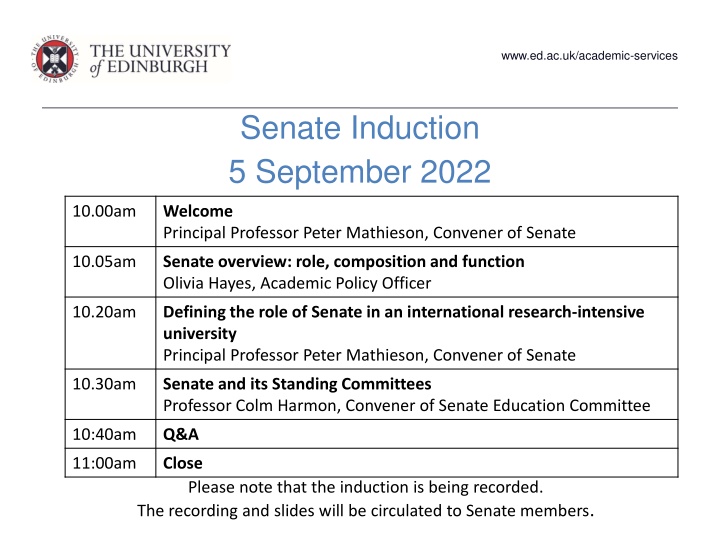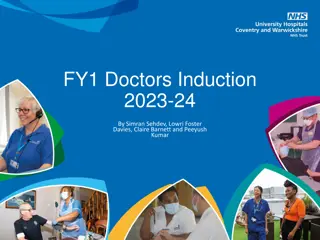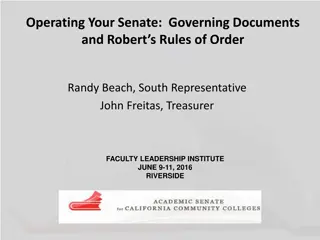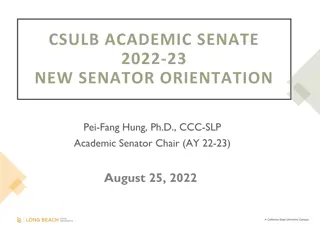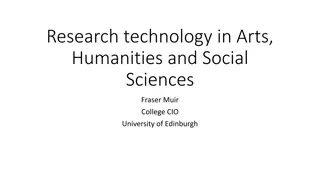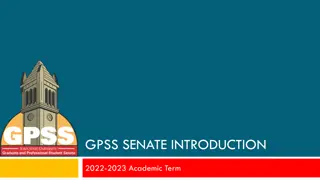Overview of Senate Induction at The University of Edinburgh
The Senate Induction at The University of Edinburgh provides valuable insights into the role, composition, and functions of the Senate in a research-intensive university setting. Key topics covered include defining the Senate's role, its standing committees, membership details, and the support team in Academic Services. The event features presentations by prominent figures such as Professor Peter Mathieson and outlines the essential information about the University's governance structure and the General Council. The content also highlights the responsibilities of the University Court and the significance of the Senate in the University's constitution.
Download Presentation

Please find below an Image/Link to download the presentation.
The content on the website is provided AS IS for your information and personal use only. It may not be sold, licensed, or shared on other websites without obtaining consent from the author.If you encounter any issues during the download, it is possible that the publisher has removed the file from their server.
You are allowed to download the files provided on this website for personal or commercial use, subject to the condition that they are used lawfully. All files are the property of their respective owners.
The content on the website is provided AS IS for your information and personal use only. It may not be sold, licensed, or shared on other websites without obtaining consent from the author.
E N D
Presentation Transcript
www.ed.ac.uk/academic-services Senate Induction 5 September 2022 10.00am Welcome Principal Professor Peter Mathieson, Convener of Senate 10.05am Senate overview: role, composition and function Olivia Hayes, Academic Policy Officer 10.20am Defining the role of Senate in an international research-intensive university Principal Professor Peter Mathieson, Convener of Senate 10.30am Senate and its Standing Committees Professor Colm Harmon, Convener of Senate Education Committee 10:40am Q&A 11:00am Close Please note that the induction is being recorded. The recording and slides will be circulated to Senate members.
www.ed.ac.uk/academic-services Senate overview: role, composition and function Olivia Hayes, Academic Policy Officer 1. 2. 3. 4. 5. 6. Senate in the University constitution Key Senate responsibilities Senate Standing Committees Senate membership Senate meetings Contacts
www.ed.ac.uk/academic-services Senate support team in Academic Services Olivia Hayes Role: Clerk to Senate, membership engagement, ensures good governance is maintained, liaison with University Court, oversight function for Senate membership, manages Senate elections and Emeritus Professor award. Arlene Duffin Role: Manages Senate membership, membership engagement, administrative support for Senate meetings.
www.ed.ac.uk/academic-services Senatewebsite and handbook Senate website: https://www.ed.ac.uk/academic-services/committees/senate Includes: Senate Standing Orders Senate Handbook Composition and membership Election regulations Dates of meetings Agendas and Papers (closed papers are circulated by email)
www.ed.ac.uk/academic-services Senate in the University constitution The University is constituted through a combination of: Acts of Parliament Secondary legislation (including Statutory Instruments and University Ordinances) Resolutions of the University Court. The Universities (Scotland) Acts 1858 1966 set out three main governance bodies: The General Council The University Court Senatus Academicus (Senate) Further information on University governance
www.ed.ac.uk/academic-services The General Council Alumni of the University Consulted on some Ordinances and Resolutions. The University Court The governing body and legal persona of the University Approves Ordinances and Resolutions On the recommendation of Senate, regulates degrees, admissions and student discipline via Resolutions Has power to review decisions of Senate Includes two Senate Assessors and one joint Senate and Academic Assessor Senate Role is to regulate and superintend teaching and discipline of the University and to promote research and responsible for the overall planning, co-ordination, development and supervision of the academic work of the institution Senate works within the strategic direction contained in the University s Strategic Plan approved by University Court
Senate and Court Thematic Committees IT Library University Collections Knowledge Strategy Committee Research Strategy Group Court Committees Audit and Risk Exception Nominations Policy & Resources Risk Management Estates Investment Court Senate Honorary Degrees Committee Senate Exception Committee Key committees with delegated authority from Senate Senate Standing Committees Academic Policy and Regulations Committee (APRC) Quality Assurance Committee (QAC) Student Appeal Committee Education Committee (SEC) Committees reporting to Senate Student Fitness to Practice Appeal Committee Committees reporting to APRC Joint Senate and Court committee Task Groups (as required) Task Groups (as required) Task Groups (as required) Student Discipline Committee Relevant College Committees
Other relevant University-wide groups University Executive The Executive s purpose is to contribute to the development of the University s strategic objectives and to oversee their implementation and delivery. Also, to act as a forum for decision-making and discussion of management and operational matters. University Executive | The University of Edinburgh Academic Strategy Group The Academic Strategy Group includes the Heads of School and is convened by the Principal. Its purpose is to discuss and contribute to University-wide strategy, initiatives and issues. Academic Strategy Group | The University of Edinburgh Further information on University committees
Key Senate responsibilities Academic governance Formally approving the award of University degrees, including honorary degrees Approving the conferment of Emeritus status on retiring professors of the University Commenting on draft Resolutions and Ordinances from Court: for example relating to the creation of new degree types or Chairs (Professorships), or approval of the Degree Regulations. Setting the academic regulatory framework (delegated to the Academic Policy and Regulations Committee) Maintaining the quality and standards of the University s awards (delegated to the Quality Assurance Committee)
Key Senate responsibilities Learning and teaching, and promoting research Hosting Presentation and Discussions on key strategic issues, providing a forum for discussion and debate Setting strategy on learning, teaching and curriculum development (largely delegated to the Senate Education Committee) Receiving updates from the Research Strategy Group
Senate Standing Committees Education Committee (SEC) convened by Vice-Principal Students Professor Colm Harmon. Academic Policy and Regulations Committee (APRC) convened by Dr Paul Norris, CAHSS Dean of Quality Assurance and Curriculum Approval Quality Assurance Committee (QAC) convened by Assistant Principal Professor Tina Harrison. Standing Committees: Each meets around 5 times each per year Report annually to Senate in June Regularly inform Senate of upcoming committee business
Senate membership Ordinance 212: Composition of Senatus Academicus Came into effect on 1 August 2020 Senate has positions for approximately 300 members. These are divided into: 100 elected academic staff members (non-professorial) 100 elected academic staff members (professorial) 30 elected student members Up to 80 ex-officio members Academic staff members elections take place in Semester 2 Student elections are managed by the Students Association
Senate members responsibilities Be collegial and constructive in approach Attend meetings and participate fully in Senate Uphold the nine principles of public life : selflessness, integrity, objectivity, accountability, openness, honesty, leadership, duty and respect. Court Members Code of Conduct. Communicate the work of Senate to the wider University Community How to get involved: Recommend themes and issues you would like to see being considered by Senate Members can bring forward motions to be added to the Agenda, motions must be seconded by another member, received in time for inclusion on the Agenda and should be competent Senate business Opportunities for getting involved in Senate Committee task groups arise from time-to-time
Senate meetings conducted under the Senate Standing Orders Ordinary meetings 3 annual Ordinary meetings, in October, February and May/June Strategic Presentation and Discussion usually coincide with the Ordinary meeting Formal Business Senate members only Agenda and papers are made available 7 days in advance E-Senate 3 annual E-Senates : these take place in advance of the Ordinary meetings, and allow routine business to be conducted electronically Papers are open for comment by email for one week Any comments are shared with members via a closed webpage A nil response is taken as assent A report of E-Senate is presented to the next Ordinary meeting
Senate meetings conducted under the Senate Standing Orders Senate Exception Committee Members are the Principal, Vice-Principal Students, Conveners of the Senate Standing Committees, the Convener of the Research Strategy Group, a representative of the Students Association (normally the President) and two further members of Senate. The Committee is rarely used though is available to make urgent formal decisions between meetings A report of any decisions is provided to the next meeting of Senate
Further information and contacts Senate website: https://www.ed.ac.uk/academic-services/committees/senate Senate Standing Orders Senate Handbook Dates of meetings Agendas and Papers (closed papers circulated by email) Contact the Senate Support team at SenateSupport@ed.ac.uk Senate Committees Newsletter: https://www.ed.ac.uk/academic-services/committees/newsletter To sign to the mailing list please contact SenateSupport@ed.ac.uk
